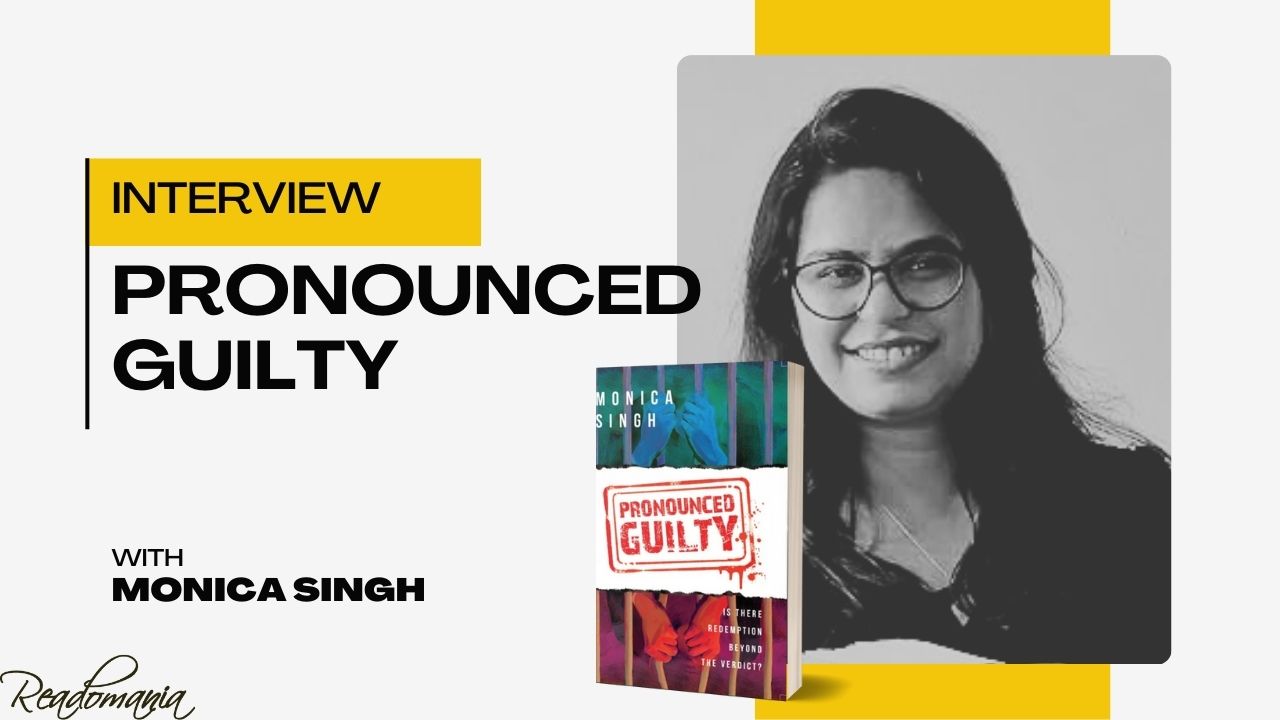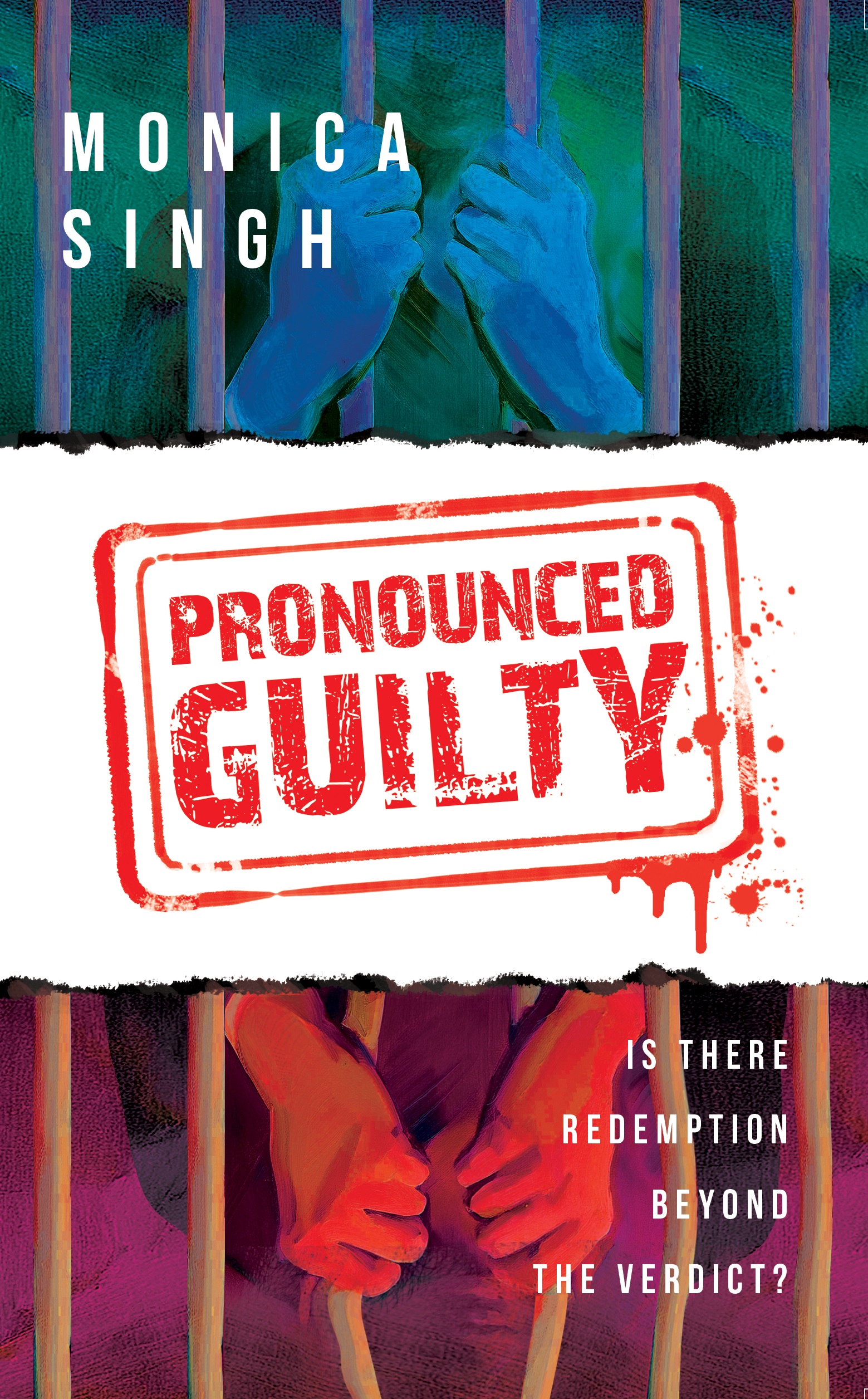Hi Monica, Congratulations on the launch of your book Pronounced Guilty!
Readomania: Why did you choose fiction as the medium to write this story?
Monica: Honestly, I’ve always been captivated by fiction; it’s been the heartbeat of my reading life. While I’ve come to appreciate nonfiction over the years and absolutely see its value, I believe fiction holds an unparalleled power to drive change and connect on a deeply emotional level. During my research for Pronounced Guilty, I delved into a lot of nonfiction—books, articles, research papers, theses, and legal manuals. And to be completely candid, most of it was dense, dry, and incredibly academic. For someone like me, who was already motivated to explore this topic, even I found the reading experience uninspiring at times. If I struggled to engage with this material, how could I expect an average reader to feel moved by it? Fiction, on the other hand, offers a unique ability to humanise facts, to create empathy, and to turn complex ideas into something more accessible and impactful. It allows readers to step into the shoes of characters, to feel their struggles, and ultimately, to understand the world from a different perspective. For me, fiction was the best vehicle to explore the themes in Pronounced Guilty, making these nuanced topics more relatable, immersive, and, hopefully, memorable for readers.
Readomania: What was the most challenging aspect of writing this book?
Monica: The legal jargon was a massive challenge. All my initial ideas of what a courtroom scene should look like came from movies like Jolly LLB—entertaining, but a bit dramatised. While Jolly LLB has its share of realism, I was venturing into something even more complex, dealing with deep moral and ethical ambiguities. So, getting the courtroom dynamics just right—capturing authentic dialogue, the interaction between advocates and judges, and all the formalities—was a learning curve. In the first draft, I went overboard with “Mi’ Lords” and “Your Honours.” Thankfully, my friend Sangeetha pointed out that in today’s courtrooms, it’s much more common to use “Sir” or “Madam” as forms of address, and that small adjustment made a huge difference. When I finally sent the manuscript out to beta readers and my editor, Indrani Ganguly, I was nervous that the courtroom scenes would feel slow or overly procedural. So, I was thrilled (and relieved) when they told me that those scenes were among the book’s most gripping parts!
Readomania: How did writing this book change you?
Monica: Writing Pronounced Guilty was a transformative experience in ways I hadn’t anticipated. Diving into the lives of individuals entangled in the justice system, I started to question many of my own preconceived notions about crime, punishment, and redemption. As I explored the complexities of my characters, I realised just how nuanced every story is—there’s so much grey between the black-and-white labels of guilty and innocent. It also deepened my empathy for people who are often dismissed by society. The research forced me to confront some uncomfortable truths about our prison system and what rehabilitation really means. I started thinking not just about the crimes, but about what drives people to certain decisions, about the systemic failures that may shape their paths, and the ripple effects of those choices. In a way, it also made me more hopeful. Writing about the possibility of change, even for those we consider “beyond redemption,” challenged me to believe in second chances—not just for the characters in my story, but in the real world too. It’s given me a deeper appreciation for the power of understanding and the resilience of the human spirit.
Readomania: Do you have a personal experience or a specific research moment that led to a turning point in the writing of this book?
Monica: Absolutely. One of the most pivotal moments for me came during my research when I came across three principles laid down by the Supreme Court of India in the Model Prison Manual (2016) regarding imprisonment and custody: A person in prison does not become a non-person. A person in prison is entitled to all human rights within the limitations of imprisonment. There is no justification for aggravating the suffering already inherent in the process of incarceration. These struck me profoundly, especially the first one: A person in prison does not become a non-person. For most of my life, I’d never truly considered prisoners as individuals with identities and rights beyond their criminal records. In my mind, they were simply “criminals.” But this simple phrase challenged that perspective, pushing me to see them as people shaped by experiences, mistakes, and sometimes, even systemic failures. The turning point came when I realised I needed to confront my own biases. Could I acknowledge that these “criminals” were human beings who might deserve a second chance? Pronounced Guilty is, in many ways, a personal exploration of empathy, forgiveness, and the difficult path to redemption. It became a way for me to start a conversation with myself—and hopefully with readers—about who deserves our compassion and what it truly means to seek change within a flawed system. If this process shifted my perspective, even a little, I hope it can do the same for others. Redemption and the possibility of second chances are themes woven deeply into the fabric of our culture and philosophy. Mahatma Gandhi’s famous words, “Hate the sin, not the sinner,” resonate with this idea—he believed in the power of people to transform and to rise above their mistakes. Similarly, in the Ramayana, after defeating Ravana, Lord Ram sends Lakshman to seek wisdom from him, illustrating respect for even a fallen enemy’s potential for knowledge and redemption. Even modern stories like Harry Potter, especially through characters like Dumbledore, echo these values, showcasing that even those who have strayed can find their way back to the light. Yet, as a society, our willingness to forgive and extend second chances often has limitations. While we crave second chances for ourselves, we can be very hesitant when it comes to granting them to others, particularly those who have crossed certain boundaries. Through Pronounced Guilty, I wanted to examine this complex, often hypocritical aspect of our human nature. I encountered a term during my research that struck me: ordinary evil. This encompasses the everyday wrongs that surround us—acts like domestic violence, stalking, marital rape, or trolling. These are actual crimes, yet they have become so normalised, so common, that society often doesn’t even acknowledge them as evil. This normalisation creates a strange paradox where some crimes are almost invisible, while others, often committed by those with fewer resources or lesser social status, become their defining label for life. Take, for example, how society treats celebrities and influential people. We’ve seen many instances where public figures accused of crimes are readily forgiven or their misdeeds brushed aside, while the poor or lesser-known individuals are defined by their crimes. It’s as though certain labels of criminality only stick to those who lack the means to challenge or evade them. So, who are we really forgiving, and who are we willing to grant redemption to? This novel doesn’t just ask if criminals deserve a second chance; it also challenges readers to reflect on their own capacity for forgiveness—both for others and themselves. In a world marred by ordinary evil, where we are surrounded by people who may have caused harm in ways we may never see, can we still afford to withhold grace? When we talk about redemption, it’s not only about the people in prisons or the ones society condemns; it’s also about us, our daily struggles, our regrets, and the opportunity to start over. I hope that Pronounced Guilty serves as a mirror, reflecting our society’s complexities, and challenges each reader to consider what forgiveness and redemption truly mean to them.
Readomania: You write both fiction as well as nonfiction. How do you decide whether a topic goes well for fiction or nonfiction?
Monica: That’s a great question! When I come across a topic or issue that interests me, I first ask myself what approach would best communicate its essence to readers. Nonfiction is ideal when I need to convey clear, factual information, where the goal is direct understanding. Topics that require an educational or informative approach—where readers need the unembellished truth, backed by data, research, or personal insight—lend themselves well to nonfiction. On the other hand, fiction allows me to explore human emotions, moral ambiguities, and deeper complexities in a way that nonfiction sometimes cannot. When I want to delve into a topic that requires empathy, imagination, or multiple perspectives, fiction becomes the perfect medium. Fictional narratives can reveal truth in subtle, nuanced ways, encouraging readers to walk in a character’s shoes, explore what ifs, and perhaps even challenge their own beliefs. For example, in Pronounced Guilty, the themes of redemption, second chances, and the grey areas within our justice system felt far more impactful through fictional characters and their journeys. Fiction allows readers to engage emotionally with these themes, making the moral and ethical questions feel personal, rather than just theoretical. Fiction, I believe, has a unique power to make us empathise deeply, and sometimes, that’s exactly what a topic needs. So, ultimately, my decision between fiction and nonfiction depends on how I believe the story or message will resonate most effectively with readers.
Readomania: You are also an editor. How did that help you with this book?
Monica: Being an editor definitely gave me a solid foundation, especially in understanding the structure, pacing, and emotional impact of the narrative. Editing allows you to see stories from a zoomed-out perspective, picking up on flow and pacing issues that authors might overlook when they’re deeply immersed in the world of their characters. When I received feedback from Indrani after the first round of edits, it felt like seeing my story in a whole new light. Her insights were invaluable, especially in highlighting how certain scenes could be sharper or how a different phrasing could heighten impact. She pointed out that the second half of the novel was slowing down the story’s momentum and recommended significant cuts. Together, we trimmed nearly 10,000+ words from the original draft! My experience as an editor really helped me embrace this process with an open mind, without clinging to parts that weren’t serving the story. Editing the book taught me a lot about myself as an author, too. It was exhilarating to see the manuscript become crisper, faster-paced, and more focused. I’m so grateful to Indrani for the lessons and the guidance.
Readomania: What are you working on next?
Monica: Right now, I’m channelling all my energy into promoting Pronounced Guilty and reaching as many readers as possible. This book has been a journey, and I’m determined to give it the attention it deserves. Meanwhile, I’ve started on my next project—a deeply personal nonfiction book on mental health and healing from trauma. This is a story I’ve carried within me for years, born from my own journey through difficult times and the path to healing. Books were my lifeline during those periods; they comforted me, and in many ways, they saved me. Now, I feel it’s my purpose to pass on that kindness. With this book, I hope to create a safe space for readers to explore their own mental health struggles and to realise that they’re never alone in their pain. I want to show that resilience and strength often bloom from our darkest moments and that there is meaning to be found even in suffering. Writing about mental health has been a long-time dream, and I hope this book will touch readers in the way that other books have touched me.
Readomania: Thank you for talking to us, Monica! we wish you all the best for all your future writing endeavours!



Comments